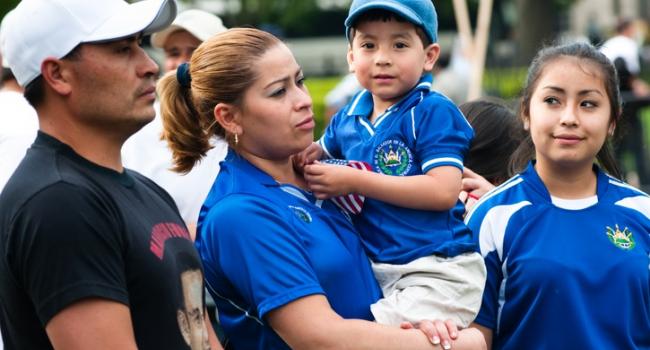Answering Questions about Immigration Enforcement
Many different stakeholders in a school community may have questions about immigration enforcement on or near school campuses. This page lays out some general information, as well as examples of how specific school districts are addressing these questions.
Note: For additional ideas, see our related webinar from Share My Lesson!
Featured Articles
- Moral Leadership and Unwavering Respect for All Kids: A Superintendent's Perspective
- Lessons from Postville: How an Immigration Raid Changed a Small Town and Its Schools
- Keep Asking Until Someone Responds: How a Small Question Had a Big Impact
- Finding Answers for Our Immigrant Students and Families: An ELL District Leader's Perspective
- Creating an Ethic of Community: How School Leaders Make Decisions Related to Immigration Policy
What You Need to Know
How to answer questions about immigration enforcement on/near school campuses
In order to provide the most accurate and up-to-date information about immigration enforcement:
- Review your district policies regarding cooperation with immigration enforcement in order to answer questions accurately and to share relevant procedures with colleagues and staff districtwide. Educators can ask for clarification from administrators, as demonstrated in this article. Check your district policy regarding cooperation with law enforcement and immigration officials; many districts have tightened these restrictions or clarified the language recently regarding immigration enforcement on school grounds, but there are several districts without any written policy. If your district has no policy in place, talk with school or district leaders about steps needed to establish a school-wide protocol if immigration enforcement agents come to the school, consulting with immigration attorneys and school district attorneys as needed.
- Work with community organizations or immigration attorneys that can provide updated information to families and staff through workshops, outreach, or other forms of communication.
- Consider appointing an immigration liaison who stays informed about changes in policy and the impact on families at the school or district.
Teachers and school leaders in particular can have a significant impact on student attendance and parent engagement by answering questions honestly, sharing school policies proactively, and asking parents what kind of support they would find helpful (such as video-streaming school events for parents without requiring attendance).
Do schools report student information to immigration?
From Illinois Legal Aid Online: No. The Family Educational Rights and Privacy Act (FERPA) does not allow schools to turn over a student’s file to federal immigration agents. The school can turn the file over if a parent consents and gives them permission or if the information does not contain the student’s immigration status. School officials are non-reporters. They are not required to report undocumented immigrants to federal agents. Any parent or guardian can ask for their child's school for information or their student records. Your immigration status or the immigration status of your child does not matter. (See more from Teaching Tolerance.)
From the American Federation of Teachers: Under FERPA, schools are prohibited, without parental consent, from providing information from a student’s file to federal immigration agentsif the information would potentially expose a student’s immigration status.
How many children live in "mixed-status" households?
According to Teaching Tolerance, 4.1 million U.S.-born children live with at least one parent or family member who is undocumented. Children may not know their own immigration status or the status of their parents, siblings, and relatives. It is possible for a child who is documented to have a sibling who is undocumented, and vice versa. A child who is born in the U.S. may have one or two parents who are undocumented.
See more in this fact sheet prepared by the U.S. Department of Education and learn more about the impact of immigration enforcement on children from this resource page from Teaching Tolerance.
School and District Responses
- Los Angeles School District Resource Website: We Are One
- Boston Public Schools: We Dream Together Website - Resources for Supporting Immigrant Students and Families
- Denver Public Schools: Bilingual Immigration FAQ from 11/14/16: These FAQs were issued by Denver Public Schools on Nov. 14, 2016. While some questions relate directly to Denver policies, much of the information is relevant to public schools nationwide and can be used as reference for similar documents. The document is available English, Spanish, Arabic, and Vietnamese.
- New York City Department of Education's Chancellor Letter and Immigration FAQ in 10 languages (NYC Department of Education website)
- Des Moines Public Schools Statement
- Ann Arbor, MI Public Schools Statement
- Portland, OR Public Schools: Supporting Immigrant Families Resource Page and Resolution
Recommended Resources
Guides & Toolkits
- Immigrant and Refugee Children: A Guide for Educators and School Support Staff (Teaching Tolerance)
- Immigrant and Refugee Children: Tools and Resources to Help Protect and Prepare Youth and Families in Event of an Immigration Raid
Related News Headlines
- How Should Schools Respond to the Concerns of Undocumented Families? (Education Week)
- ‘Know your rights’: Clinic in Va. school cafeteria aims to allay immigrants’ fears (The Washington Post)
- ‘Your child is safe’: Schools address deportation fears among immigrant families (The Washington Post)
- Educators Prepare for Immigration Agents at the Schoolhouse (The New York Times)
- I know the fears of immigrants in the schools I oversee. I was undocumented myself. (The Washington Post)







